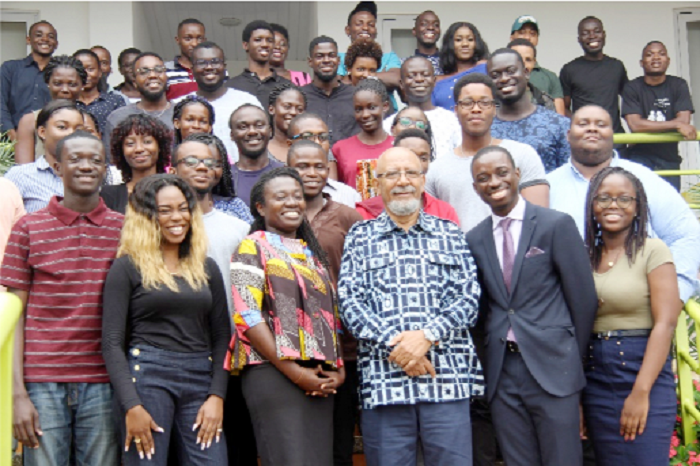
Exploring opportunities in entrepreneurship - A final year capstone course at Ashesi University
It was an honour to have been invited by Dr Sena Agbodjah Agyepong for a panel session with her cohort on opportunity spaces in entrepreneurship, and to “charge students to be disruptive as they think opportunity”. Sena and I shared a faculty room when I taught Leadership Seminars at Ashesi University, so that request was my command. I was to meet on the panel the young brilliant Ekow Mensah – a serial entrepreneur named one of the 50 Most Influential Young Ghanaians.
“What is Your Mission?”
To begin the conversation, I entreated the students to consider what each might ponder as a mission based on the following definition: “A Vision is what you see through an imaginary window; it starts in the head. A Mission is what you do; how you get there on your feet.”
The definition is aptly supported by a call for Africans to be diligent problem solvers, active doers, suggested by James Kwegyir Aggrey in the 1920s, when he charged the intellectuals of his day: “I don’t care what you know, show me what you can do.”
Re-iterating the importance of education in creating problem-solvers, I contrasted a 2015 article that bemoaned the high number of unemployed graduates in Ghana, with a later response article that asked these “unemployed graduates” to be problem solvers.
Three key educational outcomes
A meaningful education at every level must answer three key questions: One, “Is there a product you can foresee and produce?” Two, “Is there a service you can provide?” and Three, “What is a societal problem you can solve with your education?”
The United Nation’s Sustainable Development Goals (SDGs) provided a generic list of problem areas and targets that demand efforts not just from governments and corporations, but from individuals to step up and provide their support through entrepreneurship, social entrepreneurship, and advocacy.
The focus of the “One District One Factory” initiative served notice that every district in Ghana is well suited for value addition in the service or endowment peculiar to that area including agriculture. With scientific methods these days, one does not necessarily need a huge piece of land. Greenhouses in parts of California’s San Joaquin Valley towards the Silicon Valley, and southern Africa attest to the efficiencies of small scale profitable ventures in vegetables and horticulture, as two examples.
In Ghana, we are not to be pitied
Poverty must never be suggested to the youth considering the rich potential of this wonderful country. Some global exemplars put the nation’s passivity to shame. Why import foodstuffs when rice, chicken, tilapia, legumes and various nuts, for example, can be farmed locally for local employment and profits. Other examples include dairy farming to produce milk, cheese, butter, yoghurt, and so on, as done in California, Wisconsin, Denmark, etc. Equally deserving of attention is the focus on the districts to include cotton production for textiles, school uniforms, female sanitary towels, backpacks; and also corn for corn flakes and syrup, animal feed, and beverage supplements.
{loadmodule mod_banners,Nativead1}
Ekow Mensah’s Success Formula
Ekow Mensah confessed his proclivity for mathematicising everything, as he shared what he calls his Success Formula for entrepreneurship: (Awareness + Knowledge + Skills + Experience + Networks) divided by Time, and all multiplied by (Health + Ethics) = Success.
In stressing the importance of Time in this Success Formula, Mensah cautioned that Time is the denominator in this equation, and so the more of the other factors you have, the less time you spend in executing your idea in order to maximize success. He added that the global economic system and the large digital world we live in today “pays for expertise, [so aim to] become the best at what you do.” He hailed Ashesi’s honour code as imbibing the Ethics factor into students, the future business people and political leaders.
Adding value means making your product “more accessible and cheaper”. And it’s important in building partnerships and networks since people are willing to share in your vision and ideas, and corporations are willing to give you money “if you have the right structures in place.”
Papa Kojo Botsio
Papa Kojo Botsio [a grandson of Kojo Botsio of “the Big Three”, alongside Kwame Nkrumah and K.A. Gbedemah on the dawn of Ghana’s independence on the Accra Polo grounds] concluded the session. During his undergraduate years at Swarthmore College - the same liberal arts college that Patrick Awuah, Ashesi’s founder, attended - there was a lot of inspiration for beginning initiatives to find practical solutions to various pressing social issues. He identified his passion in Education during those years.
It often discouraged him to discover that other people were solving problems he had identified, but later he realized that there are enough people to be impacted in any chosen problem area, even if you are not pioneering solutions in that field. He mentioned the importance of experience in a field and learning faithfully and deeply in a specific area. Having been inspired by working in the Graduate School Recruitment Office of Cornell University during his Masters programme, he’s now set to do a Ph.D at Oxford to focus on addressing the limited access to higher education for economically and socially vulnerable students in Ghana. Botsio intended to influence policy internationally and locally in that regard.
Students’ takeaways
The students cited the following takeaways from the discussions that fruitful morning:
1. Be the best in your field or be the “Go-to person”.
2. Let your business be simple and easily accessible.
3. Look to serve other people.
4. Be exponential. Turn your passion into compassion for the many.
